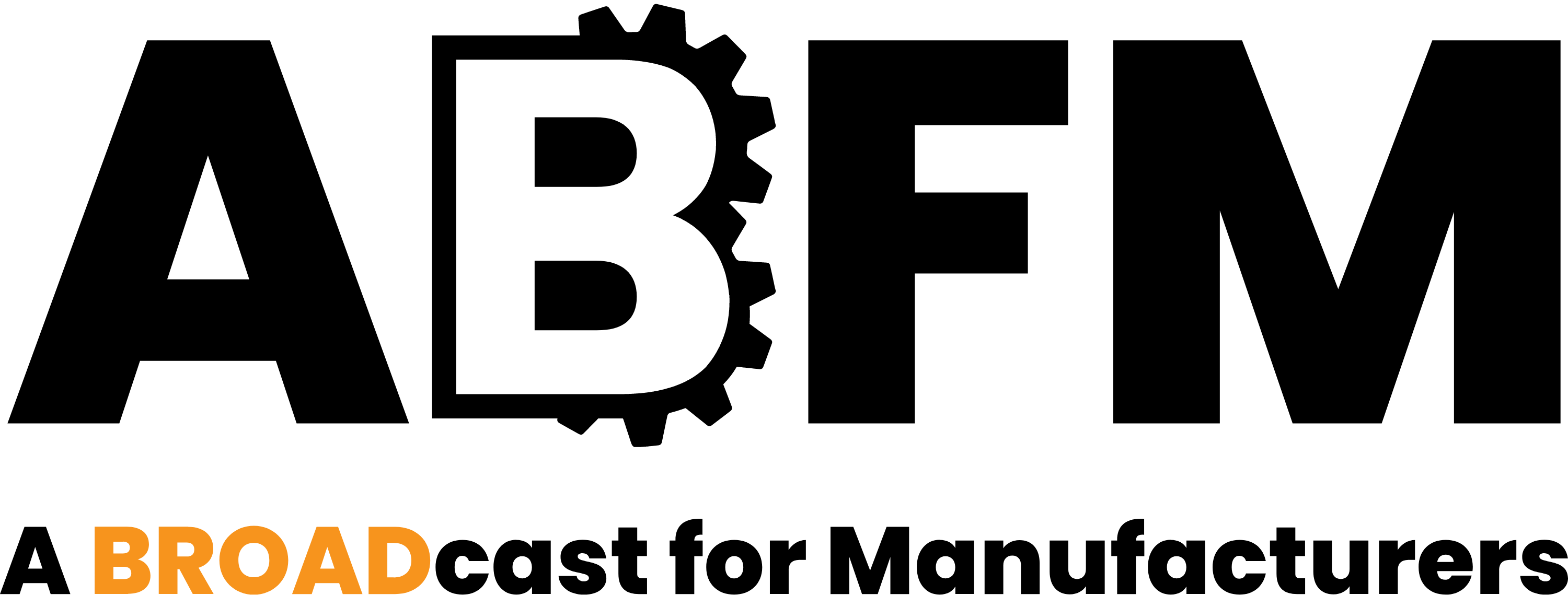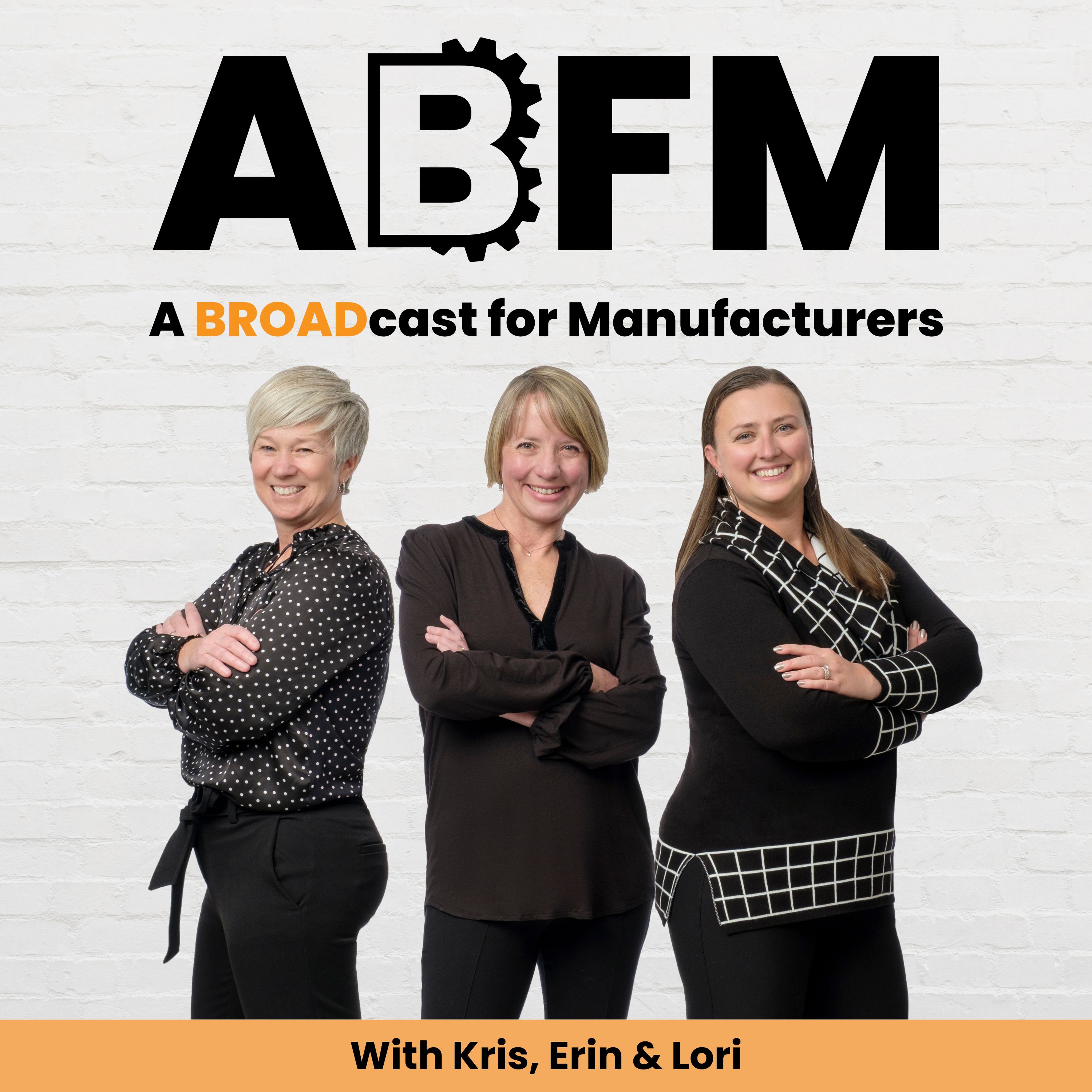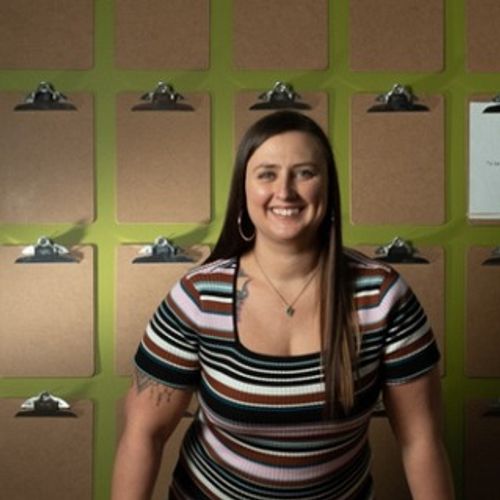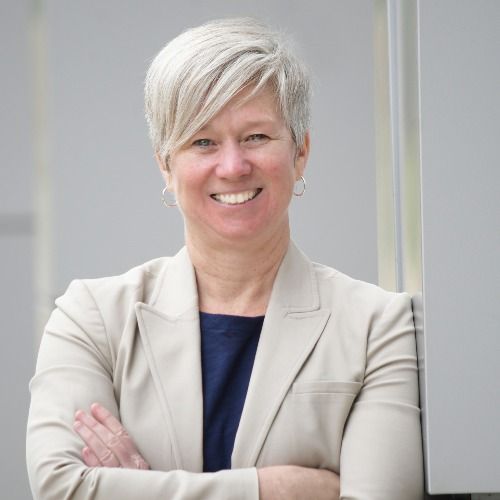Episode 68
68: Making Education Relevant for Career Success- with Erica Case
Meet Erica Case
Erica Case is currently the Head of Human Resources at LiveWire Group, LLC. Ms. Case joined LiveWire from Harley-Davidson where she was most recently Director Human Resources, Global Manufacturing and Product Development. Prior to that Ms. Case held multiple Human Resources roles in her 16 years at Harley-Davidson. Prior to joining Harley-Davidson, Ms. Case held various positions at Kraft Foods, AT&T (formerly SBC), and owned and operated The Alchemist Theatre. Ms. Case also serves on the Board of Director for Milwaukee Area Technical College and the Manufacturing Skills Standards Council. Ms. Case holds an MBA and BA from Alverno College.
Connect with Erica!
Links
The professional woman’s pocket decoder
Highlights
00:00 Introduction and Daily Question
02:04 Meet Erica Case: HR Leader and Former Theater Owner
03:28 Erica's Journey from Pre-Med to HR
05:38 The Importance of Real-World Experience in Education
10:06 Diversity and Inclusion in the Workplace
15:48 The Value of Skilled Trades and Apprenticeships
22:41 You Complete the Sentence: Fun Facts and Insights
26:58 Conclusion and Contact Information
Connect with the Broads!
Connect with Lori on LinkedIn and visit www.keystoneclick.com for your strategic digital marketing needs!
Connect with Kris on LinkedIn and visit www.genalpha.com for OEM and aftermarket digital solutions!
Connect with Erin on LinkedIn!
Transcript
[00:00:49] Erin Courtenay: A hundred percent. So into it. Very, very down with my Sagittarius nature as it is described in all of the sources.
Yes. And therefore, I believe it applies to everyone. So I will quickly, when you get to know me or meet me, briefly, I will ask you when you were born, and then I'll just spit out what your sign is, as a little party trick. And then I'll start making a bunch of assumptions about you. So, yeah. Mm hmm. Into it.
[:[00:01:21] Erin Courtenay: Yes, you are.
[:What, tell me what you learned.
[:[00:01:56] Lori Highby: Yeah, that's why we probably get along. You like the Virgo vibe.
All right. Okay. We're going to, we're going to get moving on here. We've got Erica Case is our guest today. She is currently the Head of Human Resources at LiveWire Group. Erica joined LiveWire from Harley Davidson, where she was most recently the Director of Human Resources, Global Manufacturing, and Product Development.
Prior to that, Erica held multiple human resource roles in her 16 years at Harley Davidson. Prior to joining Harley, she held various roles at Kraft Foods, AT& T, and owned and operated the Alchemist Theater. Erica also serves on the Board of Directors for the Milwaukee Area Technical College and the Manufacturing Skills Standard Council.
Erica, welcome to the show.
[:[00:02:47] Erica Case: Also, my birthday is April 2nd, if you want to like, you know, and analyze me.
[:[00:02:52] Erica Case: I am. Yeah.
[:And that's why you're going to be an amazing guest today.
[:[00:03:23] Erica Case: We can. Yeah, we did. Yes, I did. I owned a theater. It was actually okay. So also weird facts about me. I actually started college out of high school as a pre med major.
[:[00:03:35] Erica Case: And so to my senior year decided I did not want to work with doctors that I would probably get myself in trouble having to pretend that all of these old white men were super smart and when I didn't actually think that they were, so decided it was probably not a good choice for me.
Cause I guess probably true to my Aries nature, I am very open and very honest and I have opinions on everything. So figured that was not a good career fit, but didn't know what I wanted to do. So went back to school a couple of years later and my, one of my senior projects was writing a small business proposal.
And so at the time my partner was involved in theater and we actually wrote the business. So it's been a theater business model where they plan on a snack bar subsidizing the majority of their bills. Right. So if the movie flops, they don't go out of business. Right. And so they bank on that. And so we thought, hey, we're in Milwaukee. Everybody likes to drink in Milwaukee. What if we make a bar as our core pay the bills business and then I wrote the business plan and just so happened that a space opened up and we thought, Hey, we could probably do this. And so he did more of the creative stuff and I did the business end of it. And we were open for quite a few years. So it was good.
[:That was always a struggle for me when I was in school would be like, okay, I'm doing this, but for to what end any assignment or project. And I love that you're like, yeah, no, we can totally do this. Did you get extra credit on account of the fact that you did start the business?
[:[00:05:35] Lori Highby: Oh, that's super cool.
[:[00:05:38] Lori Highby: On the education topic here, you know, working in having a lot of experiences on the HR side of things, how do you feel about the current education system and how it's setting up everyone for success in their careers?
[:I feel very strongly that, we do a disservice to kids right now. So if you if you look at so our current education system does not help kids actually experience things. So if you look at research, girls form opinions on what's possible for them in a societal way by the time they're in fifth grade.
So if, and that doesn't mean I get a list of jobs from my guidance counselor that says, Hey, pick one of these titles, right? It means if I don't see somebody in action, if I don't experience something, if I don't see a woman that is an engineer or a woman that's an electrician, girls will decide that that's not a possibility for them.
And boys are a little bit slower, you know, not, not to criticize, but, you know, they're a little bit slower, but by the end of middle school, kids have decided in general, pretty much what they think is possible for them. And so I think there's a couple of pieces that I, I think we could do a better job of is one is, is having kids be able to actually experience things, not just having somebody's mom and dad come in and say, like, here's my cool PowerPoint about what I do, but like actually going to work with somebody and say, what does an engineer really do? Like, that's a big number on that title, right? A lot of kids pick engineer just because it's big numbers.
They're like, I want to make that money. But they don't know what the reality is. And you get into a four year degree program, right? And you've got professors, you're sitting in a classroom, our intern programs, our co op programs, our actual physical on the job job shadowing is not a real thing in our education system the way that it could be and should be.
So that when that child is choosing a college, or a tech school, or even a major in college, they should be able to physically go and see and experience something so that they know what they're signing up for. Because I'll tell you as an HR person, I get people at the age of 40 at the age of 50 who are miserable in their job. It affects their health, it affects their livelihood, it affects all of these things. And at that point they're set: they have a house, they have kids, they have a mortgage. All of these things that make it really difficult to change things. And so I think we can do a much better job of helping kids get exposure at an earlier age to the reality of the job so that they can make informed decisions.
They can go to college and say, nope, I know what this is. I absolutely want to do it and be happier and more successful in life. And so I feel really strongly about it. So I'm doing my best. In, in some of my jobs, I've created shadow programs where anybody that you know can come and sign up and follow a person around and see day in the life of a job or a manufacturing job or a quality to anything you think you might want to do, come spend the day with somebody and see what that really looks like. And I think more companies and more schools should enable that.
[:But on the other side, you also have companies and organizations that have kind of kept themselves a little bit siloed in terms of what they're looking for in an employee. And we're beginning to talk about that in terms of diversity and in terms of inclusion. More, you know, for like social justice reasons.
But if you think about it in terms of what would benefit the business community in bringing more and different people in, I think that both have a job to do and I I bet you have I'm I'm sure I feel very confident you have some ideas about this. I'm gonna run something by you. You know as someone who's owned a theater and now works in HR for major manufacturers, you've seen creativity from all the angles.
In your opinion, what's the most unconventional way companies, and I love this about being unconventional, by the way, way companies can make their cultures more inclusive and accessible? What are your thoughts?
[:So it was, you know, really cool group of creative, and those two groups spoke completely different languages. They would be in meetings and literally looking at each other like they were not even in the same country.
So fun fact, my dad was an engineer and my mom was an artist. So I was the oldest child. I grew up translating back and forth between mom and my dad because my dad was very logical, very, you know, this is the way that we do things. And my mom was very, you know, descriptive language and colorful and emotional in her in the way that she spoke. And so, I tapped into that experience when I was supporting those two groups.
And one of the things that I did was really try and help the two groups see each other's perspective, right? And so, the creatives would say, well, you know, this is so creative and they don't appreciate it and all these things. And I would say, but to an engineer, creating a mathematical solution to something and engineering something in a new and amazing way that is just as creative in their space as your amazing design is in your space.
And so for, so helping them to see the connections between their work and that they both had logic and they both had creativity and getting them to appreciate each other's perspective really helped them be able to, and then they still sometimes didn't speak the same language, right? And they would be like, Erica, can you tell me what that meant?
Right. Cause I don't know what they just said.
But having that, like building that appreciation for the other person's perspective was huge. And I think, you know, when I think about inclusion and diversity in the workforce, right? I think the core of it is feeling comfortable speaking your own language, showing up as who you are, and having people be open to understanding that and seeking to see your perspective. And so for me, whether it's I grew up in another country, whether it's my culture is different, whether my thought process and my idea of creativity is different, we all have an opportunity to try and understand that and relate to it and try and translate as best you can, right? And be open to those perspectives.
And for me, I've taken that example and used it multiple different times to help people try and see the other side.
[:It's like, Oh, this is more like me than I had suspected it would be. So I love that kind of exercise.
[:[00:13:55] Erica Case: Absolutely. And I, and I tell my kids this all the time, my poor children having a mom that, you know, is an HR professional, right? Like they've, they've heard all of it since the time they were young, but you learn more from finding out what you don't like sometimes than finding out what you do like.
So going out there, and I tell him things, and seeing what works for you and seeing what ignites your energy and what you feel passion around is so important. And so 90 percent of those things are probably not going to work and you're probably not going to like them. And that's okay because now you know closer to what that perfect thing is or the the one thing that you love doing. And so, you know, I really try and push people to try things and just see because until you do you're not gonna know. Which kind of going back to the first question, also about the education system, I really dislike that schools are pushing for four year colleges, right?
They get, they have they're measured on how many kids go to four year colleges. That's a measure of success for them. And it's such a disservice to a lot of kids to even not even talk about the options for two years, the options for apprenticeships, the options for on the job learning. I mean, when you think about an 18 year old and having to make a decision that's going to put them on a trajectory for the whole rest of their life, and they're given one option. Right, here's your menu of for your college degrees, please pick one.
And so I. It frustrates me that we don't have a system in place that helps kids understand. And I'm actually really excited to see a big resurgence of skilled trades in our younger generations. It's starting to finally start to come back because it's such an amazing opportunity for some kids.
[:[00:15:48] Lori Highby: Well, let's, let's, you know, looking at the trades, I want to see what you've seen from an evolution standpoint of getting more women and diversity in the trades overall.
[:And then we societally shifted into this no, no, no, the American dream is you go to a four year degree, right? And so parents and schools all started pushing kids into this four year plan, and even the mention of the trades, it just wasn't talked about. So it was just sort of this thing that didn't wasn't people weren't aware of so I think Just being able to get it out there and talk about it podcasts like yours like, you know, there's dirty jobs.
There's all kinds of things that kids growing up in the last 10 years have had exposure to that is really helping them see it as a possibility. I think another thing is parents, you know, there, there's still this perception for, you know, the Gen Xers. They grew up like, I don't know, you got to go to four year, right?
That's what I did with all my kids. And so I think, you know, so I started a youth apprenticeship program when I was supporting in manufacturing at HD. And one of the big things we did is we brought the parents and the families in to our manufacturing facility to let them tour the facility, let them see where their kids would be working, let them talk to the people that work there.
And time and time again, we got oh, I didn't realize it would be this clean. Oh, I didn't realize it would be the safe. Like they have this perception of what this is really like, that is so outdated and unrealistic. You know, and kind of going back to the comment before about companies sort of containing and not putting themselves out there, they do a disservice to themselves by not allowing people to see what it's really like to work there.
Like you're not in a forge. It's not like the Flintstones breaking stones, right? These are very safe, very clean, very high tech industries. And it was funny because I would bring the parents in, tour them through and let them see everything. And the first thing they would say is, well, can I work here? Can I, can I, can you, will you hire me?
You know, and so it's just, I think there's this full societal opportunity for us to really talk about it, make it available, let people see it, let people understand it. I mean, my oldest son started as he got early acceptance into the engineering program at Madison, got three years in and decided it wasn't for him.
He just finished his electric industrial electrician apprenticeship. He loves it. That child is making six figures with zero college debt.
And he can start his own business. He can pick his job. I mean, the demand is so high. You know, and then my youngest son just finished in investment banking and accounting and finance and he had offers, but much less, you know? And everybody, I, I very much appreciate we have a society and a place where people can find their own career, but I feel like we can do so much better by helping people understand what those options are and exposing kids to all of the possibilities.
[:So he's getting paid. And yeah, he can ride his ticket globally. But they just happened, you know, they, they live in Hawaii, so they're in a boat world and they happened to find somebody that told them about it. It wasn't that they had that is that knowledge that we all have, if you're thinking about four year school.
And I think that's, that I'm like, how many opportunities are out there that I'm not able to like even expose my kids to because ignorance, you know.
[:[00:20:36] Erica Case: Well, and I think like as a society, we can also, and I'll obviously speak to the Milwaukee area because that's where I am, but like a high school kid, not all high school kids have access to a vehicle, not all high school kids. Some high school kids depend on school. And so even if I'm out there offering opportunities for them, they don't have transportation, you know, our transportation from the city into industrial areas. It's not amazing in Milwaukee. If they're leaving campus and they don't have food, right? Then what does that do to them?
And, you know, and these are not always kids that feel safe saying to an adult, Hey, I didn't get to eat today. Right? Because they come from a world where that doesn't always work. And so how do we also do a better job of providing wraparound services to kids in these situations that will enable that.
Right. I mean, you can apply that to high schools, to tech colleges, to even four year colleges, right? All of the institutional payments and financial aid are set up for tuition and books, right? We have all kinds of students trying to like, when we talk about women in manufacturing or anywhere, right?
A lot of women have children. There's a lot of single moms trying to get into, you know, family sustaining careers. Daycare is not provided if you go back to college in any concept, right? There's not support systems there. So it's really difficult for a female to get into some of these careers because we don't enable it.
It's challenging.
[:And I, you know, like you said, that's happening with the trades. It's happening with the community colleges and two year colleges really getting more exposure for, you know, what kind of opportunities are out there. So, there's a lot of hope in the air.
[:I just learned that... So, Erin, what did you just learn?
[:It's like, you know, spelunking, but in buildings. I think it sounds super cool. And so I looked on a website of one of the people that did it and it's like old churches, you know, in places. And I'm from the Southwest. We used to go to ghost towns. It'd be like going into ghost towns. So there's a hobby for you.
If anybody's looking for one. Urbex, you can Google it.
[:[00:23:31] Erin Courtenay: How about you, Lori?
[:I'm just going to share a couple stats. 28 percent are very satisfied in their career. So I kind of think yes, 54 percent are somewhat satisfied and 18 percent are very unsatisfied. Now this is the part that's really interesting. When asked the question about like, do you feel that there's still a glass ceiling in the, in your industry?
Overwhelmingly the majority still agreed with that statement. So, heavy on the 18 to 34 year old and 35 to 55 year old segments. And only a small percentage disagreed with that statement. So, unfortunate. And non white respondents, 87 percent said the glass ceiling still exists for women in their industry.
[:[00:24:35] Lori Highby: So, there's talk about change, but people aren't feeling it. Mm hmm.
[:[00:24:43] Erin Courtenay: Oh, yeah. And it goes back to some of the earlier things you were saying, Erica, about, like, let's make a workforce, let's make a workplace where a person can go if they have kids. If they can't, don't have the transportation, we just need to do some infrastructure.
Words are nice. You're just not going to get it done. Right. Yeah.
[:[00:25:13] Erica Case: Okay, so this is a different topic. So we're moving some of our, our jobs currently from like the Silicon Valley area. Super cool, super fun, right? To Milwaukee. And so my team is trying to come up with, you know, a sales pitch on why Milwaukee is amazing. One of my team members lives in Nashville, she's never been to Summerfest, and so she was Googling it, and she said, Did you know that Summerfest is the largest music festival in the world?
Book of World Records in like:So technically, even though there are other festival music, it was in the world that are bigger, they've not competed. So they get to keep the title because they are the Guinness Book World Record Holder for largest music festival in the world.
[:[00:26:21] Lori Highby: That's so cool. Because I mean, I've been at Milwaukee and I've heard that forever. Right. And I've never, like, I questioned like the validity of it, but that is so cool that it was a legit. Yeah. Guinness Book of World Records. That's awesome.
[:[00:26:40] Erica Case: Right.
[:[00:26:57] Lori Highby: That's great. Well, this is a great conversation, Erica. If anyone is interested in reaching out and connecting with you, what's the best way they can do that?
[:[00:27:17] Lori Highby: All right. We'll include that in the show notes as well. Thank you so much for being on the show. Great conversation.
[:[00:27:26] Lori Highby: All right. This is three broads wrapping up. Go out there and make something awesome.




